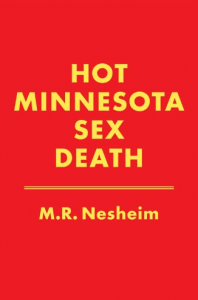
Unlike Lanchester, who addresses his subject subtly, exploring it from the point of view of deeply detailed characters and the relationships among them, Nesheim dispenses with both characterization and, for the most part, plot. Hot Minnesota Sex Death is pure allegory. Every character and situation in the novel represents in some way or another the recent banking crisis. We encounter Bears and Bulls and Freddy Mac and Fannie Mae. Orgasm is called “Junk Joy” and the behavior of the townspeople is clearly a proxy for the behavior of irresponsible Wall Street traders. Sex here stands in for more general lust and greed, a sort of synecdoche for all wrongdoing. Excessive, loveless sex represents out-of-control stock trading devoid of any purpose other than immediate gratification.
The Nedians went forth thinking the town was booming with sensual prosperity…they traded numbers recklessly, they cashed in numbers that had little quality and exercised no restraint as they tried to fulfill their urges.
Nesheim is not subtle, which is good, because if you miss the allegory, this book will seem even weirder than it seems once you figure out what is going on. Once you’ve started making the connections with the recent stock market fiasco, it reads something like Pilgrim’s Progress, only funnier. And yes, it is funny in places. There are several ongoing gags and one slapstick bit that might be described as “Monty Python does Pilgrim’s Progress.”
The book has a few problems that make it difficult to follow. There are actually two allegories working at once, in a layered fashion. The economic allegory is itself a representation of the fall of Man. (The town is called Nede, an anagram of Eden, and there are many other parallels.) This double-strand meaning muddles things a bit and makes it difficult to tease apart the religious theme from the economic theme. Also, there are so many characters of varying forms (both human and otherwise) that it becomes difficult to keep up with everyone or even to figure out the purpose of some of them. The prose itself is oddly spare, despite a great deal of description. Actions are described in excruciating detail, and conversations go on for pages, often involving several characters. The effect is more like reading a screenplay than a novel. But this book isn’t really a novel at all; it is a humorous allegory.
When read as such, Hot Minnesota Sex Death is quite successful, managing to make some rather serious economic points while keeping the atmosphere (mostly) light and the reader on his or her toes busily identifying characters and anticipating the results. Even though you know what happened in the real banking crisis, and therefore might think you can guess how things will work out in Nede, the ending offers a couple of interesting surprises. It’s a wild ride, almost as mind-blowing as the financial crisis itself.
Links
Amazon
Barnes & Noble
Get an Editorial Review | Get Amazon Sales & Reviews | Get Edited | Get Beta Readers | Enter the SPR Book Awards | Other Marketing Services






















Leave A Comment